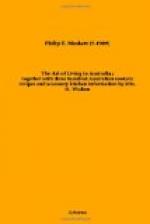bright and sunny Australia we find a piano and a sewing
machine, and yet either of these costs far more than
an ice chest, and perhaps as much to keep in repair
as the ice to fill it. Looking at it from many
points of view, it ought to be considered an indispensable
article of furniture, and it has this great advantage
over many “household gods,” that the first
expense is the last; for it never gets out of order,
and lasts a lifetime; and this cannot be said of many
other pieces of furniture, which perhaps cost more
and yet are not so useful. In such a warm climate
as this, where for six months in the year our one
desire is to keep cool, it must certainly be worth
while to secure a simple and inexpensive article which
will help us to attain this object. Looking at
the matter from the Domestic Economy point of view,
we shall certainly decide at once in favour of the
purchase. Housekeepers, both young and experienced,
know how much food has to be thrown away because it
will not keep sweet for even a few hours in the hot
season. All this waste is at an end if there
is ice about, as it will keep perishable food cool
and pleasant and ready for a second meal. Many
odds and ends of vegetables, fish, and meat can be
turned into a dainty salad with the ice chest which
must have been thrown away without it. Thus the
expense, not only of the ice, but also of the chest,
is soon saved, to say nothing of the pleasure and
enjoyment of the said salad, which one would so infinitely
rather have had than the chops and steaks so universally
served. Delicious little breakfast dishes can
be concocted over night from the remains of fish and
meat served at tea and put down into the ice all night.
These are cooked in a few minutes in the morning, and
form such a pleasant change to the standing dish of
eggs and bacon; and how proud a good house-keeper
will feel when her little dishes are enjoyed, and
she knows that they have cost nothing!—for
the food would not have kept, and must therefore have
been thrown away if she had not possessed an ice chest.
This is only one instance of what may be accomplished,
but in the daily routine of work many more will be
found. Think, for a moment, of the state of the
butter without ice on a hot day. Who does not
dread the sight of the liquid or greasy fat usually
seen in the butter-dish, and what a remote chance
there is of enjoying a slice of bread and butter with
bread as hard and dry as a brickbat, and butter running
to oil? Put both into a refrigerator and note
the difference. Look at it, also, from the hygenic
standpoint. Most people, save the very strong
and robust, lose their appetite during the hot season,
and therefore feel languid and weak. Give them
dry bread and liquid butter, and they can’t
touch a morsel; but with fresh bread, hard butter,
and some dainty tit-bit, kept in the ice also, placed
before them, a good meal is often enjoyed. Again,
in cases of illness ice becomes at once a necessity;
and if it is at hand in the house and ready for use
much time and trouble will be saved, and suffering
too, as the poor invalid waits with what patience
he can for the relief which is so often brought with
ice.




